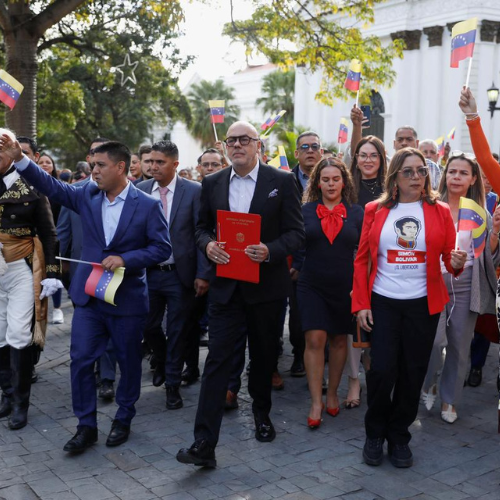Venezuelan lawmakers have passed a controversial law that labels economic sanctions, such as those imposed by the United States, as crimes against humanity. This decision has raised alarms both inside and outside the country, as it directly targets opposition leaders and citizens who have spoken in favor of these measures. The bill, which carries severe penalties, is the latest move by Venezuela’s government to crack down on dissent.
Economic Sanctions Declared a Crime Against Humanity by New Law
The Venezuelan National Assembly, controlled by the ruling party, approved the bill on November 28. According to the law, anyone who supports economic sanctions could face criminal charges, be banned from running for office, and even have their property confiscated. The punishment is severe: a conviction could result in at least 25 years in prison.
The government claims that sanctions imposed by countries like the U.S. amount to a widespread and systematic attack on Venezuela’s population. These sanctions have particularly hurt Venezuela’s vital oil industry, which is the backbone of its economy. The government argues that these measures are a deliberate attempt to harm the country and have caused immense suffering among its people.
However, critics say that this law is not about protecting citizens but about silencing opposition voices. Many opposition leaders have supported sanctions as a way to pressure the government into holding fair elections and respecting democratic norms.
Opposition Leaders in the Crosshairs
This law comes at a time of heightened political tension in Venezuela, following a disputed presidential election in July. The election results were controversial, with the government declaring victory for its leader while the opposition claimed that their candidate had won by a large margin. Electoral authorities provided no detailed vote counts, fueling further doubts about the results.
After the election, massive protests broke out across the country, and government forces responded with harsh crackdowns. Thousands of people were arrested, including protesters, lawyers, and election volunteers. Some opposition leaders have gone into hiding, while others have fled the country to avoid arrest.
Venezuela’s Machado Accused of Treason Over US Sanctions Support
The new law directly targets opposition leaders who have supported sanctions in the past. Some have already been barred from running for office under administrative rulings. Others are now facing fresh criminal investigations for their public statements in favor of international pressure on the government. These accusations include serious charges like treason and conspiracy, which carry heavy prison sentences.
A Chilling Effect on Free Speech
Critics warn that this new law is designed to silence dissent by making it dangerous for anyone to even speak out against the government. The law allows authorities to prosecute people who support sanctions, even if they are not in the country. This means that opposition leaders who have fled Venezuela could still face trials in absentia, lose their property, or be banned from returning to politics.
The timing of this law has also raised eyebrows. It came just a day after the United States announced new sanctions against individuals accused of undermining the recent election. The law appears to be a direct response to these sanctions and is likely aimed at discouraging further international action against the Venezuelan government.
Opposition leaders, however, remain defiant. In a video message posted on social media, one prominent leader rejected the accusations against her, saying that fighting for change in Venezuela is not a betrayal of the country. She urged people to continue resisting despite the government’s attempts to silence them.
This new law is the latest move in a long-running struggle between Venezuela’s government and its opposition. It highlights the growing risks faced by anyone who dares to challenge those in power. Critics argue that this measure has little to do with protecting Venezuela from foreign interference and everything to do with crushing dissent and consolidating control.
This law has sparked heated debates about democracy, human rights, and the role of international sanctions. For now, one thing is clear: the political crisis in Venezuela shows no signs of easing, and the government’s new measures are likely to further deepen divisions in an already fractured nation.


